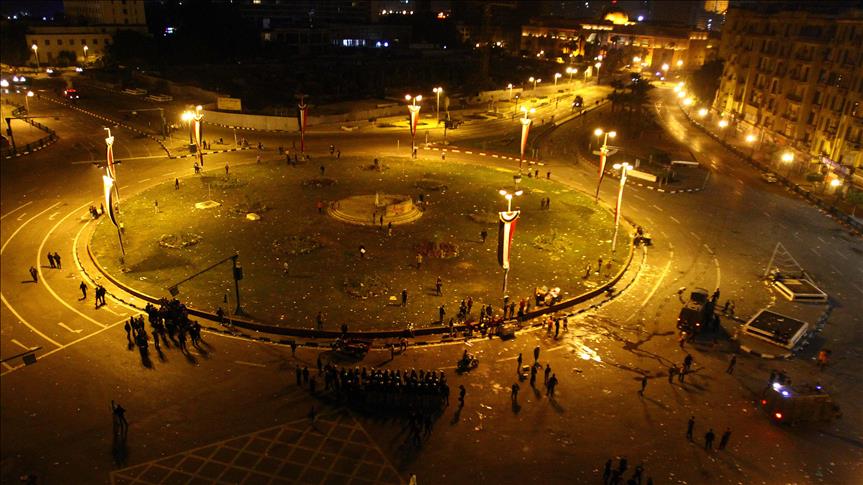7yrs since Egypt uprising, revolution's goals go unmet
Revolutionary demands for 'bread, freedom and social justice' remain largely unfulfilled, Egyptian experts say

Al Qahirah
By Mohamed al-Rayyes
CAIRO
Egyptians have endured seven difficult years since the January 25 uprising that forced autocratic President Hosni Mubarak to step down after 30 years in power.
Local experts, meanwhile, remain divided regarding the country’s short- and medium-term prospects for political and economic improvement.
On Jan. 25, 2011, Egyptians took to the streets in massive numbers to protest corruption and police brutality, both of which had been widespread under the Mubarak regime.
Following 18 days of unabated protests, Mubarak was eventually forced to step down and relinquish power to the Egyptian military.
Seven years on, however, the revolutionaries’ demands for “bread, freedom and social justice” have gone almost entirely unmet, according to Hassan Nafaa, a professor of political science at Cairo University.
Egypt’s current situation, Nafaa told Anadolu Agency, “is far from what the revolutionaries had hoped for… it’s far worse now than it was before Jan. 25, 2011."
The current army-backed regime of President Abdel-Fattah al-Sisi, he added, “rules with an iron fist and has little interest in achieving the revolution’s objectives."
One year after the uprising, Egyptians elected Mohamed Morsi, a Muslim Brotherhood leader, in the country's first-ever free presidential election.
After a single year in office, however, amid mounting protests against his rule, Morsi was ousted in a bloody military coup led by al-Sisi, who assumed the presidency himself in a second election in 2014.
In the almost five years since Morsi’s ouster, Egypt’s army-backed authorities have waged a relentless crackdown on his supporters and members of his Muslim Brotherhood group, killing hundreds and throwing tens of thousands behind bars.
- Achievements, failures
“Seven years on, the January 25 Revolution, like most revolutions, can boast both achievements and failures,” Atef Saadawi, an analyst at Egypt’s semi-official Al-Ahram Center for Political and Strategic Studies, told Anadolu Agency.
"The revolution’s most important achievement was that it reoriented the relationship between citizens and the ruling authority,” he said.
“At the very least, the revolution destroyed the notion that the ruler of Egypt was God on earth,” Saadawi added. “It also destroyed the widespread fear [of the temporal ruler] that had long prevailed in Egypt.”
"Nevertheless, no one can deny that -- seven years on -- Egypt remains beset by a host of political, economic, cultural and social problems," he asserted.
Saadawi went on to dismiss the assertion, however, that the 2011 uprising had all been for naught.
“The revolutionary idea is about more than just politics,” he said. “The implications of recent developments [in Egypt] could signal major changes in the future.”
The analyst conceded, however, that popular demands for bread, freedom and social justice “has, unfortunately, yet to be answered."
Egypt continues to struggle with mounting inflation caused largely by the decline in value of its currency -- a trend the government has sought to offset by borrowing from international institutions.
In late 2016, the Egyptian pound lost almost half of its value after the central bank devalued the currency in an effort to rein in a flourishing black market for dollars.
Along with hard-currency shortages, the country has also been hard hit by declines in both tourism and foreign investment due to ongoing turmoil in Egypt -- and the Middle East region in general -- since 2011.
- ‘Limited space’
Said Sadiq, a professor of political sociology at the American University in Cairo, for his part, believes some revolutionary demands were achieved -- at least temporarily -- before Morsi’s ouster in 2013.
For example, he said, the 2011 uprising had led to a period of unprecedented social and media freedom -- in which criticism of the country’s political leaders became commonplace -- that diminished again after the coup against Morsi.
In the months following Morsi’s departure, the authorities launched a harsh crackdown on the coup’s opponents, outlawing the Muslim Brotherhood and designating it a "terrorist organization".
“Now there is very limited space for political criticism,” Sadiq said. “If you engage in it, you will have problems with the authorities."
"The [2011] revolution served to make Egyptian society more politically aware, but most of the revolution’s goals have not been met,” he added.
“Unfortunately,” Sadiq went on, “the deteriorating economy and mounting unemployment have made many Egyptians view the revolution in a negative light and not as a viable mechanism for change."
"Egypt went through a period of unprecedented popular engagement in politics until 2013,” he added. “But mismanagement and inexperience on the part of Egypt’s revolutionary forces ultimately led to the revolution’s downfall.”
In mid-2014, al-Sisi -- who had served as defense minister under Morsi before spearheading the coup against him -- came to power through a presidential election marred by numerous irregularities.
*Ali Abo Rezeg contributed to this report from Ankara
Anadolu Agency website contains only a portion of the news stories offered to subscribers in the AA News Broadcasting System (HAS), and in summarized form. Please contact us for subscription options.

